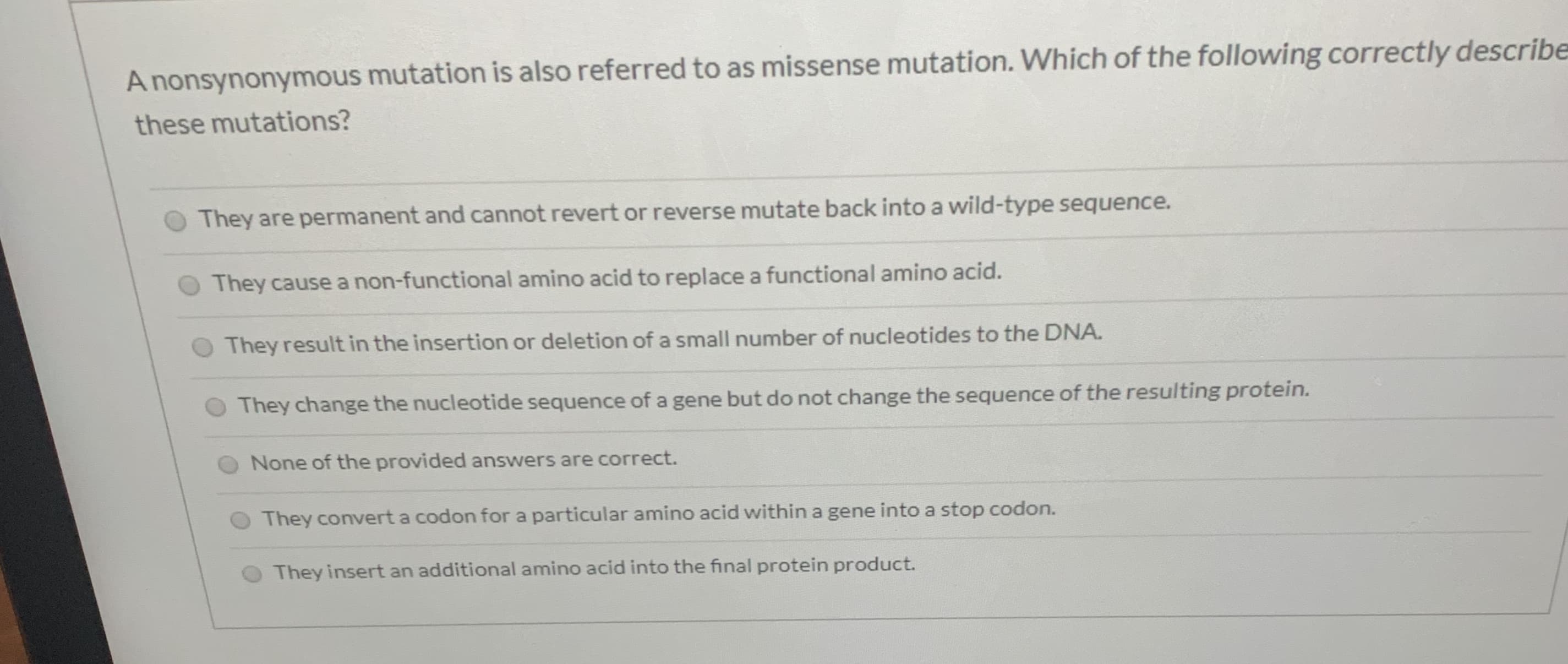A nonsynonymous mutation is also referred to as missense mutation. Which of the following correctly describe these mutations? They are permanent and cannot revert or reverse mutate back into a wild-type sequence. They cause a non-functional amino acid to replace a functional amino acid. O They result in the insertion or deletion of a small number of nucleotides to the DNA. They change the nucleotide sequence of a gene but do not change the sequence of the resulting protein. None of the provided answers are correct. They convert a codon for a particular amino acid within a gene into a stop codon. They insert an additional amino acid into the final protein product.
A nonsynonymous mutation is also referred to as missense mutation. Which of the following correctly describe these mutations? They are permanent and cannot revert or reverse mutate back into a wild-type sequence. They cause a non-functional amino acid to replace a functional amino acid. O They result in the insertion or deletion of a small number of nucleotides to the DNA. They change the nucleotide sequence of a gene but do not change the sequence of the resulting protein. None of the provided answers are correct. They convert a codon for a particular amino acid within a gene into a stop codon. They insert an additional amino acid into the final protein product.
Human Heredity: Principles and Issues (MindTap Course List)
11th Edition
ISBN:9781305251052
Author:Michael Cummings
Publisher:Michael Cummings
Chapter11: Genome Alterations: Mutation And Epigenetics
Section: Chapter Questions
Problem 6QP: Although it is well known that X-rays cause mutations, they are routinely used to diagnose medical...
Related questions
Topic Video
Question

Transcribed Image Text:A nonsynonymous mutation is also referred to as missense mutation. Which of the following correctly describe
these mutations?
They are permanent and cannot revert or reverse mutate back into a wild-type sequence.
They cause a non-functional amino acid to replace a functional amino acid.
O They result in the insertion or deletion of a small number of nucleotides to the DNA.
They change the nucleotide sequence of a gene but do not change the sequence of the resulting protein.
None of the provided answers are correct.
They convert a codon for a particular amino acid within a gene into a stop codon.
They insert an additional amino acid into the final protein product.
Expert Solution
This question has been solved!
Explore an expertly crafted, step-by-step solution for a thorough understanding of key concepts.
This is a popular solution!
Trending now
This is a popular solution!
Step by step
Solved in 2 steps

Knowledge Booster
Learn more about
Need a deep-dive on the concept behind this application? Look no further. Learn more about this topic, biology and related others by exploring similar questions and additional content below.Recommended textbooks for you

Human Heredity: Principles and Issues (MindTap Co…
Biology
ISBN:
9781305251052
Author:
Michael Cummings
Publisher:
Cengage Learning

Biology Today and Tomorrow without Physiology (Mi…
Biology
ISBN:
9781305117396
Author:
Cecie Starr, Christine Evers, Lisa Starr
Publisher:
Cengage Learning

Human Heredity: Principles and Issues (MindTap Co…
Biology
ISBN:
9781305251052
Author:
Michael Cummings
Publisher:
Cengage Learning

Biology Today and Tomorrow without Physiology (Mi…
Biology
ISBN:
9781305117396
Author:
Cecie Starr, Christine Evers, Lisa Starr
Publisher:
Cengage Learning